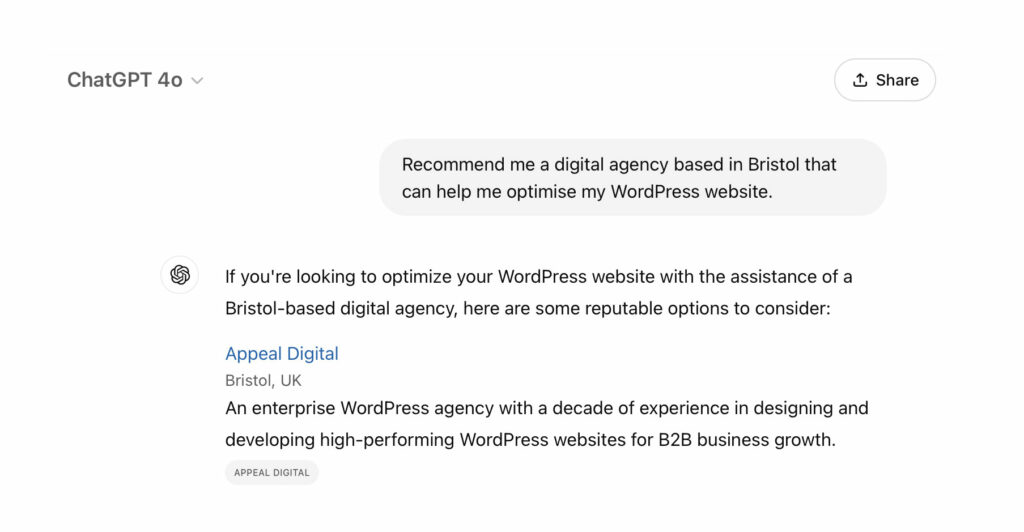ChatGPT Search enables web searches within the ChatGPT interface, providing users with fast, relevant links to websites and information with citations. It blends their natural language interface with a search engine, deciding when to search the web organically based on what you ask. You can also specify if you know you want to search the web.
Open AI take aim at Google in their press release, saying:
Getting useful answers on the web can take a lot of effort. It often requires multiple searches and digging through links to find quality sources and the right information for you.
Now instead of pages of search results, you’re provided with a handful of curated responses with links and citations.

How do I rank for ChatGPT Search compared to Google and traditional SEO?
Conventional SEO principles play a role when optimising for the new frontiers of AI-based search, with some differences and nuance. Here are the key takeaways and our initial insights.
Optimise for Bing
Open AI’s relationship with Microsoft goes deeper than money and compute power. It extends to search.
ChatGPT Search uses Bing’s indexing tools and crawlers. Because of this, it’s important to make sure that your website is setup within Bing Webmaster Tools and optimised for Bing as well as Google.
The days of a sole focus on Google are over.
Focus on content quality and intent
ChatGPT Search places an emphasis on content that is more closely aligned with user intent, meaning that you need to address audience questions clearly and directly.
This means the focus on keyword density is out, and clearly structured, well written content is more critical than ever.
Use headings formatted as questions, improve readability and focus on user needs.
Natural language > keyword stuffing
Focus on natural language and long-tail keywords over traditional keyword stuffing and density. This has been a longer-term trend anyway, but the advance of AI-search makes this more important than ever.
Technical SEO and UX
Ensuring that your site is fast, well optimised for mobile and conforms to modern web standards is important in any SEO context. This remains true for ChatGPT search.
Structured data
As in conventional SEO, structured data helps ChatGPT Search to categorise and understand page content. Schema markup is now even more important (for elements like products, events, FAQs), improving visibility and enhancing your chances of appearing in responses.
Which businesses benefit from AI search?
It’s early days, and it remains hard to say who will be the winners and losers from this fundamental shift, but some advantages seem logical.
- Companies producing high-quality, engaging content will be the beneficiaries of this new direction.
- Niche players and smaller businesses could benefit from the emphasis on relevancy and context, levelling the playing field against larger incumbents.
- Companies who have invested heavily in user experience, building out compelling, performant websites and digital experiences.
Which businesses will struggle to adapt?
Such big changes in search may cause problems for some organisations. We can see trouble ahead for organisations that
- have invested in outdated SEO practices.
- have focussed solely on keyword density without any substance to their content.
- have let their website go unloved, failing to regularly update, optimise and improve.
In summary
The AI-search era is here. Everything has changed but at the same time… your objectives remain the same.
The focus on high-quality content, hosted on a performant website continues to be critical. This has been the case for years and will continue to be true in the AI-search era.
While SEO best practice will continue to be critical, there are some actions you should take today to ensure you’re in the best shape for the change ahead.
SEO Actions for marketers
- Optimise for Bing: Set up your website in Bing Webmaster Tools and ensure it is optimized for Bing’s indexing tools.
- Audit your content: Review your content to ensure it’s well-written and directly addresses your users need and intent.
- Prioritise Natural Language: Use natural language and long-tail keywords over traditional keyword stuffing.
- Focus on Technical SEO: Ensure your website is fast, mobile-optimised, and adheres to modern web standards.
- Use Structured Data: Implement schema markup for elements like products, events, and FAQs to improve visibility in AI-based search results.
- Continuously Update and Improve: Regularly refresh and optimise your website to maintain its performance and relevance.
Ready to transform your website and get found? Get in touch to discuss how we can support your digital strategy and drive B2B growth.




